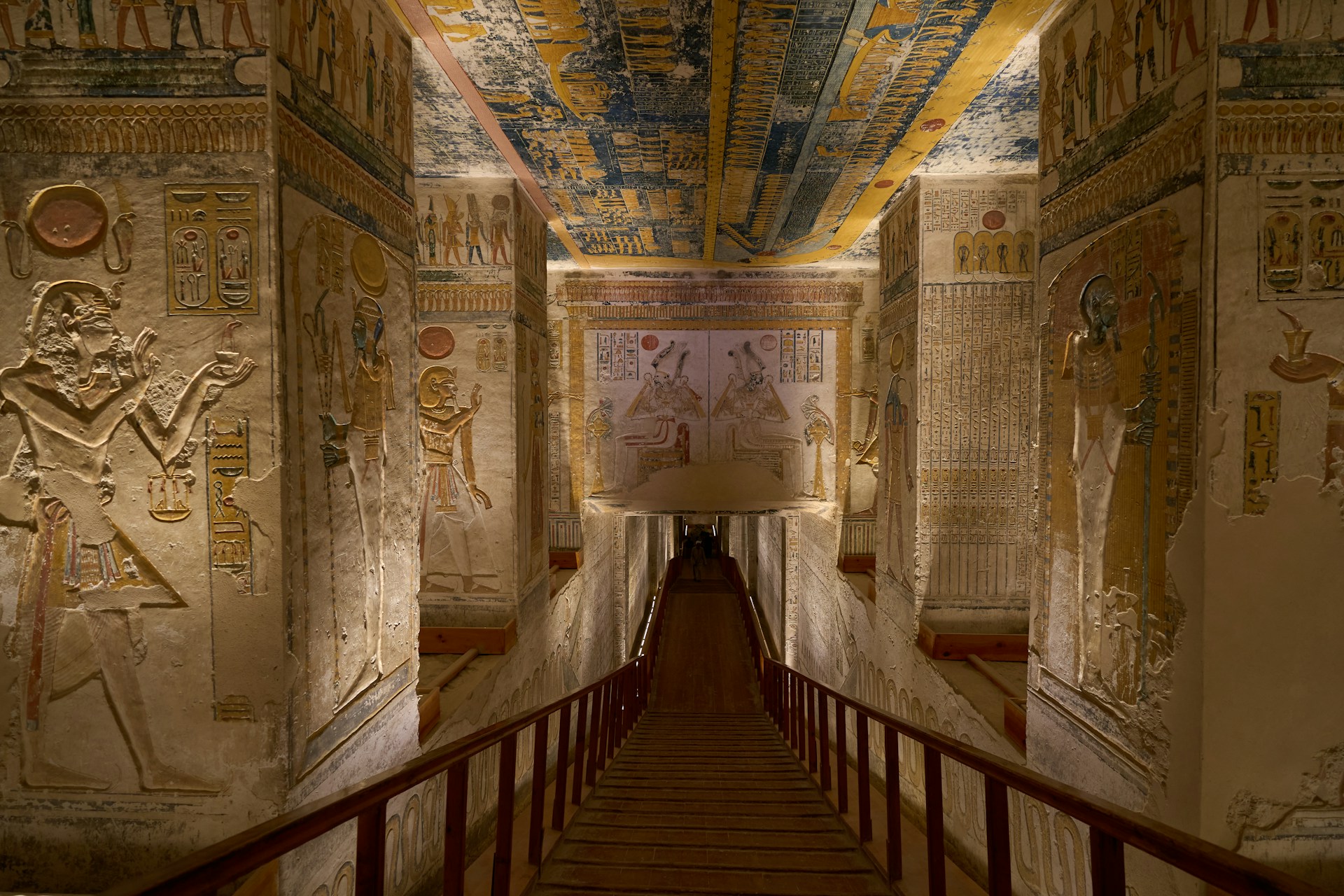the National Museum of Egyptian Civilization embarks on a captivating journey through Egypt's rich tapestry of history and culture


Post Introduction
the National Museum of Egyptian Civilization embarks on a captivating journey through Egypt's rich tapestry of history and culture
Post Content
Located in the heart of Al-Fustat, Cairo, The National Museum of Egyptian Civilization (NMEC) is one of Egypt’s most ambitious and strategically important cultural projects. More than just a museum, it is a sweeping narrative of Egypt’s history, taking visitors on a full journey from prehistoric settlements to modern times.
Unlike conventional museums that focus on specific periods, the National Museum of Egyptian Civilization is the first of its kind in the Arab world to present a complete, chronological and thematic overview of over 7,000 years of Egyptian civilization. With over 50,000 artifacts on display across 135,000 square meters, it offers an unparalleled historical experience.
Since its grand moment on the global stage in 2021—when the Royal Mummies Parade transferred 22 ancient kings and queens to their new home—the museum has become a top destination for history lovers, researchers, and tourists alike. It blends past and present in a modern space that invites wonder, reflection, and pride.
The design of the museum draws inspiration from Egypt’s natural and cultural heritage. Located above historic Coptic Cairo and near ancient Islamic capitals, the structure symbolizes continuity across all eras—from ancient pharaohs to Islamic dynasties.
Its sandstone exterior and flowing form echo the Nile River’s life-giving role. Inside, the central dome evokes the power of ancient tombs and the elegance of Islamic architecture, anchoring the museum as both futuristic and timeless.
Modern and inclusive, the museum is built for accessibility. With clear exhibition paths, ramps, digital displays, and smart lighting systems, it provides a seamless and enjoyable experience for every visitor.
Explore the world’s largest archaeological museum, The Grand Egyptian Museum
The heart of the museum lies in its Chronological Hall, where Egypt’s major historical periods are presented in rich detail:
Multimedia storytelling, original relics, and immersive design make this part of the museum an unforgettable timeline of human achievement.
Beyond timelines, the museum explores how ancient Egyptians lived, worked, and believed. The Thematic Galleries include:
These curated zones show how daily life evolved and flourished, highlighting Egypt’s influence on global civilization. Each section deepens the visitor’s understanding of heritage beyond royal figures.
For deeper context about ancient daily life, explore the historic marketplace Khan Al Khalili.
A centerpiece of the museum is the awe-inspiring Royal Mummies Hall. Here, visitors meet 22 royal figures such as Ramses II and Queen Hatshepsut. The display is designed to replicate the silent reverence of the Valley of the Kings, combining mood lighting, advanced preservation, and forensic reconstructions to breathe life into ancient legacies.
Curious about what’s inside The Egyptian Museum of Cairo? Click to find out
The museum isn’t just for sightseeing. It’s a serious research center that collaborates with global universities and museums. Conservation labs within the facility restore artifacts using cutting-edge science, contributing to both Egyptian and international collections.
Families, students, and scholars benefit from the museum's educational programs. Interactive learning zones, digital workshops, and curated tours are offered in multiple languages, making it a hub for lifelong learning.
Learn more about ancient beliefs and rituals by exploring the stunning Temple of Hatshepsut.
From augmented reality to touchscreen navigation, the museum uses advanced tools to bring history alive. The digital timeline helps contextualize events across eras, while multilingual audio guides personalize each visitor’s journey.
Not in Egypt? No problem. The museum offers remote access through online tours and interactive digital archives. This ensures that its educational mission reaches a global audience.
Since its official inauguration, the museum has revitalized cultural tourism in Cairo. Its proximity to key sites like Cairo Tower and the historic district of El Moez Street makes it a perfect anchor for heritage-focused itineraries.
The museum is now central to Egypt’s soft power. By hosting high-profile events, conferences, and foreign dignitaries, it projects a modern image of a country proud of its ancient roots.
The museum is located in Al-Fustat, beside the scenic Ain Al-Sira Lake. Getting there is easy via metro or taxi.
For a perfect cultural day, combine it with a trip to the timeless Citadel of Salah Al-Din.
Opening Hours: 9:00 AM – 5:00 PM (daily)
Egyptian Citizens: 60 EGP
Foreign Visitors: 200 EGP
Discounts: Available for students and groups
What makes it unique?
It’s the only museum in Egypt that covers the full scope of Egyptian civilization chronologically and thematically.
Are the mummies real?
Yes. The museum houses authentic royal mummies in state-of-the-art conservation chambers.
Can I take pictures?
Photography is allowed in many areas, but flash and tripods are generally restricted.
Is it kid-friendly?
Yes. It offers family-focused programs and engaging educational tools.
Does it offer virtual tours?
Absolutely. Many of the exhibits can be accessed online from anywhere in the world.
Best time to visit?
Weekday mornings are usually less crowded, making it ideal for relaxed exploration.
The National Museum of Egyptian Civilization is a powerful tribute to one of the oldest, richest civilizations in human history. It combines ancient grandeur with modern innovation. Whether you’re a curious traveler, a passionate historian, or a lifelong learner, the museum promises an experience that educates, inspires, and connects you with the timeless story of Egypt.
To extend your journey through Egypt’s legacy, explore the legendary Nile River, the breathtaking Abu Simbel Temples, and the unforgettable Dendera Temple.